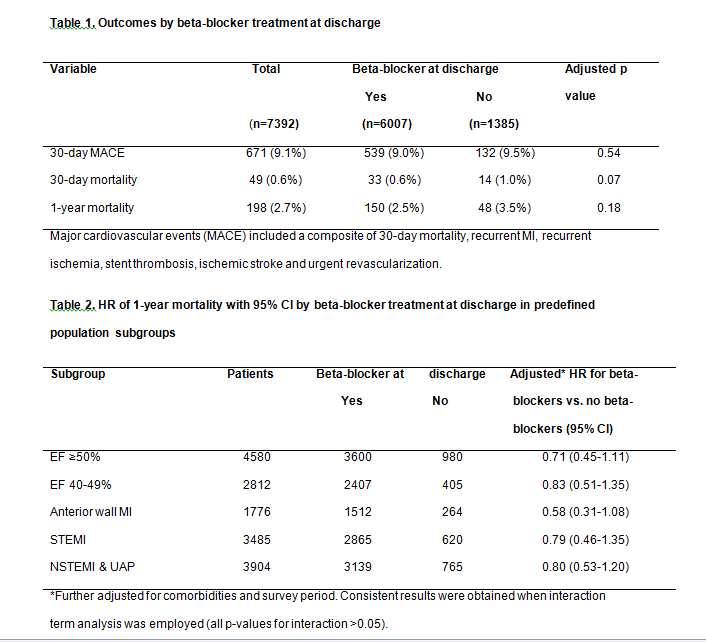
Comparison of Outcomes with or without Beta-Blocker Therapy After Acute Myocardial Infarction in Patients Without Heart Failure or Left Ventricular Systolic Dysfunction (ACSIS)
2Leviev Heart Center, Sheba Medical Center and Sackler School of Medicine, Tel Aviv University, Tel Aviv, Israel
3Cardiology Department, Clalit Health Services, Tel Aviv, Israel
4Department of Cardiology, Edith Wolfson Medical Center, Holon and Sackler School of Medicine, Tel Aviv University, Tel Aviv, Israel
5Department of Cardiology, Ziv Medical Center, Faculty of Medicine, Bar-Ilan University, Tsfat, Israel
6Department of Cardiology, Kaplan Medical Center, Rehovot, Hadassah – Hebrew University School of Medicine, Israel
Introduction: The contemporary benefit of routine beta-blocker therapy following myocardial infraction in the absence of heart failure or left ventricular systolic dysfunction (LVSD) is unclear. Material and Method: We investigated the impact of beta-blockers on post myocardial infarction outcome in patients without heart failure or LVSD among patients enrolled in the biennial Acute Coronary Syndrome Israeli Surveys (ACSIS). MACE rates at 30 days and overall mortality at one year were compared among patients discharged on beta-blockers vs. not, after multivariate analysis to adjust for baseline differences. Results and discussion: Between the years 2000-2016, data from 15.211consecutive ACS patients were collected. Of 7392 patients who met the inclusion criteria, 6007 (79.9%) were discharged on beta-blocker therapy. Prescription of beta-blockers at discharge increased modestly from 32% to 38% over the 16-year period. The 30-day MACE rates were similar in patients on vs. not on beta-blockers at discharge (9.0% and 9.5%, respectively). One year survival did not differ significantly between those on vs. not on beta-blockers (HR 0.8, 95% CI 0.58-1.11, P= 0.18). Conclusion: In a nationwide survey of all AMI patients, beta-blocker therapy did not alter 30-day MACE or 1-year mortality post MI in patients without heart failure or reduced ejection fraction. Contemporary dedicated large randomized clinical trials are needed to further guide adequate management.

Powered by Eventact EMS